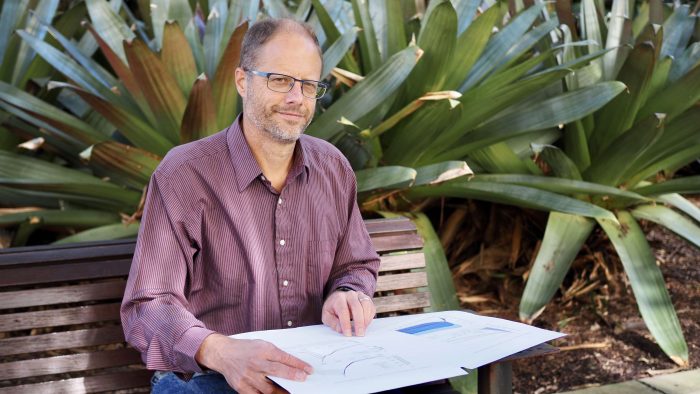Jonathan Brown with Centre researchers.

Experts at the ARC Centre of Excellence for Climate Extremes have challenged the concept of a known “carbon budget”, arguing based on new calculations that action on emissions is more like a “climate gamble” with worsening odds as each year of inaction passes.
“Our research calculated the probabilities of meeting the Paris targets of 1.5° and 2.0°” says Centre Chief Investigator Professor Steven Sherwood.
“You’ll often hear that we have a certain number of years left to act on climate change. What our research shows is that it’s more like a climate gamble. If we stopped all human activity contributing to climate change today, we’d still have a 22% chance of exceeding the 1.5° Paris target. If we wait a year, that chance grows. Another year and it grows again. Every year we wait increases our chance of missing the Paris targets and facing more climate change extremes in the future” says Sherwood.
The paper “Probability of committed warming exceeding 1.5◦C and 2.0◦C Paris targets” published in Environmental Research Letters uses world leading modelling to show policy makers and Governments that action now can still make an important and significant difference.
“The problem with the carbon budget idea is that we don’t know exactly how big the budget is and it could run out any time. For Governments and policy makers the climate gamble and continued emissions is like using a pokies machine programmed to give you worsening odds each day” says Sherwood.
“How long do you keep gambling knowing that your odds are getting worse every day? The good news for Governments and policy makers is our research backs acting on emissions now. The idea of a “carbon budget” we can spend up until the last moment is wrong. The sooner we stop gambling on emissions, the safer we will be, and the sooner we can plan for the health and wellbeing of our communities without guessing where the next gamble will take us. Every year matters.”
The research modelled likelihoods for meeting 1.5° and 2.0° if
- Emissions had stopped in 2020 completely and
- If emissions stabilised in 2020 and stopped by 2040.
For the second scenario, the research finds a 90% likelihood of passing the 1.5° Paris target and 17% likelihood of passing the Paris 2.0° target.
PAPER
Sherwood et al 2022 Environ. Res. Lett. https://doi.org/10.1088/1748-9326/ac6ff6
